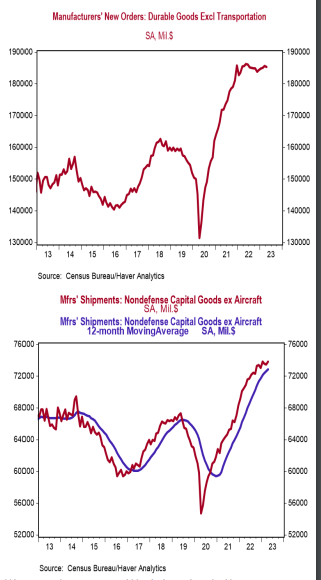- Personal income rose 0.4% in April (-0.3% including revisions to prior months), matching consensus expectations. Personal consumption rose 0.8% in April (+0.9% including revisions to prior months), beating the consensus expected +0.5%. Personal income is up 5.4% in the past year, while spending has increased 6.7%.
- Disposable personal income (income after taxes) increased 0.4% in April and is up 7.9% from a year ago.
- The overall PCE deflator (consumer prices) rose 0.4% in April and is up 4.4% versus a year ago. The “core” PCE deflator, which excludes food and energy, rose 0.4% in April and is up 4.7% in the past year.
- After adjusting for inflation, “real” consumption rose 0.5% in April and is up 2.3% from a year ago.
Implications:
Income and spending rose in April as consumers continue to navigate elevated inflation and an uncertain path ahead. The best news in today’s report was that incomes rose 0.4% and are up 5.4% in the last year, led by gains in private-sector wages & salaries (+0.5% for the month and up 5.6% year-to-year). Those would be great numbers in a normal low-inflation environment, but the fiscal and monetary mistakes made since COVID have led to persistently high inflation that has taken a big bite out of that spending power, with real (inflation-adjusted) incomes up just 1.0% in the last year. In spite of lackluster real income gains, consumer spending rose a rapid 0.8%, led by spending on services. Spending on goods also rose in April after monthly declines in the two months prior, but in the last year, spending on services is up 8.4% while goods spending is up 3.6%. This transition from goods toward services has been an ongoing theme in the past year. Given the surge in goods activity during COVID as many services were shut down, we expect goods spending will struggle to keep pace as the economy continues to shift back towards a more “normal” mix of activity. On the inflation front, PCE prices – the Federal Reserve’s preferred measure of prices – rose 0.4% in April, pushing the twelve-month comparison up to 4.4% from 4.2% in March. PCE inflation has been coming down on a year-to-year basis since it peaked at 7.0% last June, but this shouldn’t make the Fed sanguine on inflation. “Core” inflation, which excludes food and energy is up 4.7% on a year ago comparison basis and down less than a percentage point from the 5.4% peak in core inflation last February. In other words, this has been a slow slog lower. While goods prices have been moderating (up 2.1% from a year ago versus 10.6% back in June of last year), service inflation remains stubbornly high and has shown little sign of easing (up 5.5% from a year ago versus 5.1% back in June). Note that the Fed is now closely watching a subset of inflation dubbed the “Super Core,” which is services only (no goods), excluding food, energy, and housing. That measure rose 0.4% in April and is up 4.5% versus a year ago. Inflation continues to take a toll on the economy, which is also feeling more of the effect of the slowdown in the money supply over the past year. The economy was still growing in April, but we think tougher times are ahead.





